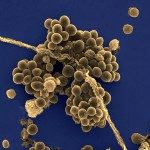Lien vers Pubmed [PMID] – 22158870
J. Biol. Chem. 2012 Feb;287(7):4544-51
Pathogenic bacteria can resist their microenvironment by changing the expression of virulence genes. In Salmonella typhimurium, some of these genes are controlled by the two-component system PhoP-PhoQ. Studies have shown that activation of the system by cationic antimicrobial peptides (AMPs) results, among other changes, in outer membrane remodeling. However, it is not fully clear what characteristics of AMPs are required to activate the PhoP-PhoQ system and whether activation can induce resistance to the various AMPs. For that purpose, we investigated the ability of a broad repertoire of AMPs to traverse the inner membrane, to activate the PhoP-PhoQ system, and to induce bacterial resistance. The AMPs differ in length, composition, and net positive charge, and the tested bacteria include two wild-type (WT) Salmonella strains and their corresponding PhoP-PhoQ knock-out mutants. A lacZ-reporting system was adapted to follow PhoP-PhoQ activation. The data revealed that: (i) a good correlation exists among the extent of the positive charge, hydrophobicity, and amphipathicity of an AMP and its potency to activate PhoP-PhoQ; (ii) a +1 charged peptide containing histidines was highly potent, suggesting the existence of an additional mechanism independent of the peptide charge; (iii) the WT bacteria are more resistant to AMPs that are potent activators of PhoP-PhoQ; (iv) only a subset of AMPs, independent of their potency to activate the system, is more toxic to the mutated bacteria compared with the WT strains; and (v) short term exposure of WT bacteria to these AMPs does not enhance resistance. Overall, this study advances our understanding of the molecular mechanism by which AMPs activate PhoP-PhoQ and induce bacterial resistance. It also reveals that some AMPs can overcome such a resistance mechanism.

